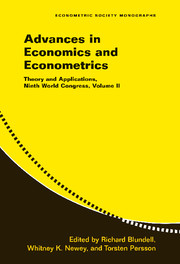Book contents
- Frontmatter
- Contents
- Contributors
- Introduction by the Editors
- Advances in Economics and Econometrics
- 1 Empirical Models of Auctions
- 2 Identification in Models of Oligopoly Entry
- 3 Empirical Models of Imperfect Competition: A Discussion
- 4 Recent Developments in the Economics of Price Discrimination
- 5 Bounded Rationality in Industrial Organization
- 6 Price Discrimination and Irrational Consumers: Discussion of Armstrong and Ellison
- 7 Behavioral Economics
- 8 Incentives and Self-Control
- 9 Discussion of “Behavioral Economics”
- 10 Dynamic Models for Policy Evaluation
- 11 Microeconometric Search-Matching Models and Matched Employer-Employee Data
- 12 Discussion of ‘Dynamic Models for Policy Evaluation’ and ‘Microeconometric Search-Matching Models and Matched Employer-Employee Data’
- 13 Field Experiments in Development Economics
- 14 Institutions and Development: A View from Below
- Index
- Titles in the series
13 - Field Experiments in Development Economics
Published online by Cambridge University Press: 05 January 2013
- Frontmatter
- Contents
- Contributors
- Introduction by the Editors
- Advances in Economics and Econometrics
- 1 Empirical Models of Auctions
- 2 Identification in Models of Oligopoly Entry
- 3 Empirical Models of Imperfect Competition: A Discussion
- 4 Recent Developments in the Economics of Price Discrimination
- 5 Bounded Rationality in Industrial Organization
- 6 Price Discrimination and Irrational Consumers: Discussion of Armstrong and Ellison
- 7 Behavioral Economics
- 8 Incentives and Self-Control
- 9 Discussion of “Behavioral Economics”
- 10 Dynamic Models for Policy Evaluation
- 11 Microeconometric Search-Matching Models and Matched Employer-Employee Data
- 12 Discussion of ‘Dynamic Models for Policy Evaluation’ and ‘Microeconometric Search-Matching Models and Matched Employer-Employee Data’
- 13 Field Experiments in Development Economics
- 14 Institutions and Development: A View from Below
- Index
- Titles in the series
Summary
Abstract
There is a long tradition in development economics of collecting original data to test specific hypotheses. Over the last 10 years, this tradition has merged with an expertise in setting up randomized field experiments, resulting in an increasingly large number of studies where an original experiment has been set up to test economic theories and hypotheses. This paper extracts some substantive and methodological lessons from such studies in three domains: incentives, social learning, and time-inconsistent preferences. The paper argues that we need both to continue testing existing theories and to start thinking of how the theories may be adapted to make sense of the field experiment results, many of which are starting to challenge them. This newframework could then guide a new round of experiments.
There is a long tradition in development economics of collecting original data in order to test a specific economic hypothesis or to study a particular setting or institution. This is perhaps due to a conjunction of the lack of readily available high-quality, large-scale data sets commonly available in industrialized countries and the low cost of data collection in developing countries, though development economists also like to think that it has something to do with the mind-set of many of them. Whatever the reason, the ability to let questions determine the data to be obtained, instead of the data determining the questions that can be asked, has been the hallmark of the best work in empirical development economics and has led to work that has no equivalent in other fields, for example, Townsend (1994) and Udry (1994).
- Type
- Chapter
- Information
- Advances in Economics and EconometricsTheory and Applications, Ninth World Congress, pp. 322 - 348Publisher: Cambridge University PressPrint publication year: 2006
- 25
- Cited by

